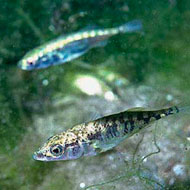
Study highlights the impacts of noise on aquatic ecosystems
Fish anti-predator behaviour is affected in different ways in different species following acoustic disturbance, according to a new study.
Animals must avoid predation to survive and reproduce, and there is increasing evidence that man-made factors can influence predator−prey relationships.
The laboratory study, from the Universities of Bristol and Exeter, examined how additional noise - playback of field recordings of a ship passing thorough a harbour - affected responses to a visual predatory stimulus in two fish species, the three-spined stickleback and the European minnow. Both share similar feeding and predator ecologies but differ in body armour.
The sticklebacks responded significantly more quickly to the visual predatory stimulus - a flying seagull model - when exposed to additional noise compared to control conditions, where playback was from the same harbour without the ship noise.
Meanwhile the minnows exhibited no significant change in their response latency.
Lead author Dr Irene Voellmy of Bristol's School of Biological Sciences said the results suggested elevated noise have the potential to affect anti-predator behaviour in different ways.
"Noise levels in many aquatic environments have increased substantially during the last few decades, often due to increased shipping traffic. Potential impacts of noise on aquatic ecosystems are therefore of growing concern."
Dr Steve Simpson, who was part of the research team along with Dr Julia Purser and Dr Andrew Radford, said; "If we want to effectively manage noise in the marine environment, we next need to assess the spatial scale over which individual animals and populations are affected. This means taking experiments like this one to offshore environments near to real-world noise sources."
The study has been published in PLOS ONE and can be read at www.plosone.org/article/info%3Adoi%2F10.1371%2Fjournal.pone.0102946
Image CC BY-SA 3.0



 The RCVS has announced a new version of its 1CPD mobile app, with enhanced features for veterinary surgeons and veterinary nurses to record their continuing professional development.
The RCVS has announced a new version of its 1CPD mobile app, with enhanced features for veterinary surgeons and veterinary nurses to record their continuing professional development.